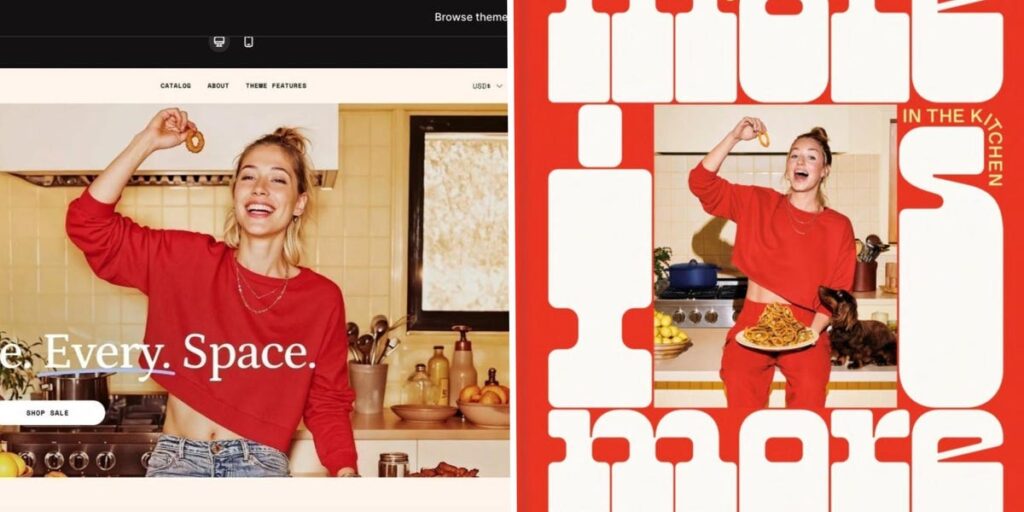Molly Baz, a New York Times bestselling author and food creator with around 829,000 Instagram followers, is accusing Shopify of ripping off her likeness.
Baz noticed that the e-commerce giant was offering a website theme for merchants that included an image that looked eerily similar to the cover art for her cookbook, “More Is More: Get Loose in the Kitchen.”
Shopify has since taken down the template, which it said was designed by a third-party developer.
The sample website design featured a woman in a red sweatshirt eating an onion ring in a butter-yellow kitchen. It resembles Baz’s photo, which she used on her cookbook, website, and Instagram profile, down to the hand gesture and cut of her red sweatshirt.
“Shopify is using a sicko AI version of me to sell its new website themes,” Baz wrote on Instagram. “Shame, shame.”
“A third-party theme developer used imagery resembling Ms. Baz without permission, which violates our terms,” a Shopify spokesperson told Business Insider. “We immediately removed the theme using Ms. Baz’s likeness once we became aware, have informed Ms. Baz’s team, and are working with the developer to ensure this does not happen again.”
Shopify did not respond to follow-up questions about its relationship with the developer that was listed on its website, Presidio, or whether other designs by Presidio were removed.
It is unclear whether Presidio used artificial intelligence to create the theme, as Baz suggested. The developer has created websites for popular brands, including hair care company Ouai and restaurant group Momofuku, according to Shopify’s website. The company did not respond to requests for comment.
Baz and her publisher, Clarkson Potter, did not immediately respond to requests for comment. Peden + Munk, the photographers for “More Is More,” declined to comment.
Generative AI could lead to unintentional copycat art
The rise of one-click AI image generation has put artists and creators on high alert for possible dupes of their work. It’s raised questions around whether an AI platform that used their work for training, often without permission, could produce outputs that copy their likeness or artistic style.
“Given the enormous volume of data that these models are trained on, it’s inevitable that some marketers who rely on those tools may inadvertently create and then use assets that could unknowingly infringe on someone’s publicity rights,” Robert Freund, an advertising and e-commerce lawyer, told Business Insider.
Despite those risks, AI use is on the rise among some marketers who have begun using the technology to produce everything from written copy to imagery or even UGC videos.
And some bad actors have used celebrity likenesses without their permission on purpose. In 2023, MrBeast flagged a deepfake version of his likeness that was used to hawk $2 iPhones on TikTok, for example.
Read the full article here
















